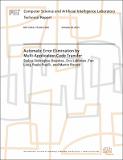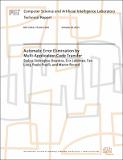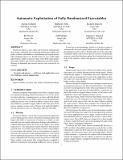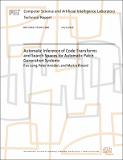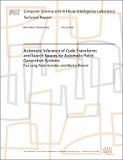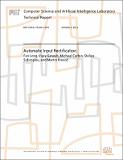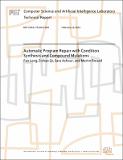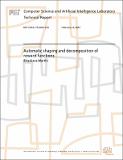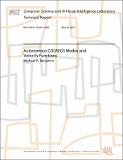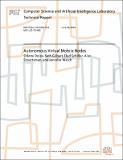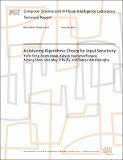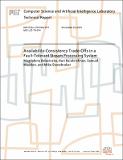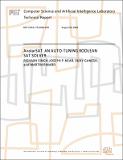Browsing CSAIL Digital Archive by Title
Now showing items 80-99 of 806
-
Automatic Error Elimination by Multi-Application Code Transfer
(2014-09-30)We present pDNA, a system for automatically transfer- ring correct code from donor applications into recipient applications to successfully eliminate errors in the recipient. Experimental results using six donor applications ... -
Automatic Error Elimination by Multi-Application Code Transfer
(2014-08-11)We present pDNA, a system for automatically transferring correct code from donor applications into recipient applications to successfully eliminate errors in the recipient. Experimental results using three donor applications ... -
Automatic Error Elimination by Multi-Application Code Transfer
(2014-10-02)We present Code Phage (CP), a system for automatically transferring correct code from donor applications into recipient applications to successfully eliminate errors in the recipient. Experimental results using six donor ... -
Automatic Error Finding in Access-Control Policies
(2010-05-05)Access-control policies are a key infrastructural technology for computer security. However, a significant problem is that system administrators need to be able to automatically verify whether their policies capture the ... -
Automatic Exploitation of Fully Randomized Executables
(2019-06-11)We present Marten, a new end to end system for automatically discovering, exploiting, and combining information leakage and buffer overflow vulnerabilities to derandomize and exploit remote, fully randomized processes. ... -
Automatic Inference of Code Transforms and Search Spaces for Automatic Patch Generation Systems
(2016-07-08)We present a new system, Genesis, that processes sets of human patches to automatically infer code transforms and search spaces for automatic patch generation. We present results that characterize the effectiveness of the ... -
Automatic Inference of Code Transforms and Search Spaces for Automatic Patch Generation Systems
(2016-07-08)We present a new system, Genesis, that processes sets of human patches to automatically infer code transforms and search spaces for automatic patch generation. We present results that characterize the effectiveness of the ... -
Automatic Input Rectification
(MIT CSAIL, 2011-10-03)We present a novel technique, automatic input rectification, and a prototype implementation called SOAP. SOAP learns a set of constraints characterizing typical inputs that an application is highly likely to process ... -
Automatic Parallelization With Statistical Accuracy Bounds
(2010-02-10)Traditional parallelizing compilers are designed to generate parallel programs that produce identical outputs as the original sequential program. The difficulty of performing the program analysis required to satisfy this ... -
Automatic Program Repair with Condition Synthesis and Compound Mutations
(2015-02-12)We present PCR, a new automatic patch generation system. PCR uses a new condition synthesis technique to efficiently discover logical expressions that generate desired control- flow transfer patterns. Presented with a set ... -
Automatic shaping and decomposition of reward functions
(2007-02-13)This paper investigates the problem of automatically learning how torestructure the reward function of a Markov decision process so as tospeed up reinforcement learning. We begin by describing a method thatlearns a shaped ... -
Automatic Software Upgrades for Distributed Systems
(2005-11-30)Upgrading the software of long-lived, highly-available distributed systems is difficult. It is not possible to upgrade all the nodes in a system at once, since some nodes may be unavailable and halting the system for an ... -
Automatic Software Upgrades for Distributed Systems
(2005-10-06)Upgrading the software of long-lived, highly-available distributedsystems is difficult. It is not possible to upgrade all the nodes in asystem at once, since some nodes may be unavailable and halting thesystem for an ... -
Automatic Software Upgrades for Distributed Systems (PhD thesis)
(2005-10-06)Upgrading the software of long-lived, highly-available distributedsystems is difficult. It is not possible to upgrade all the nodes in asystem at once, since some nodes may be unavailable and halting thesystem for an ... -
Automatic Test Factoring for Java
(2005-06-08)Test factoring creates fast, focused unit tests from slow system-widetests; each new unit test exercises only a subset of the functionalityexercised by the system test. Augmenting a test suite with factoredunit tests ... -
Autonomous COLREGS Modes and Velocity Functions
(2017-05-16)This paper concerns an implementation of an autonomy system for unmanned surface vessels operating in accordance with the Coast Guard Collision Regulations (COLREGS). The autonomy system is implemented by associating a ... -
Autonomous Virtual Mobile Nodes
(2005-06-15)This paper presents a new abstraction for virtual infrastructure in mobile ad hoc networks. An AutonomousVirtual Mobile Node (AVMN) is a robust and reliable entity that is designed to cope with theinherent difficulties ... -
Autotuning Algorithmic Choice for Input Sensitivity
(2014-06-23)Empirical autotuning is increasingly being used in many domains to achieve optimized performance in a variety of different execution environments. A daunting challenge faced by such autotuners is input sensitivity, where ... -
Availability-Consistency Trade-Offs in a Fault-Tolerant Stream Processing System
(2004-11-22)processing. In contrast to previous techniques that handlenode failures, our approach also tolerates network failuresand network partitions. The approach is based on a principledtrade-off between consistency and availability ... -
AvatarSAT: An Auto-tuning Boolean SAT Solver
(2009-08-26)We present AvatarSAT, a SAT solver that uses machine-learning classifiers to automatically tune the heuristics of an off-the-shelf SAT solver on a per-instance basis. The classifiers use features of both the input and ...

